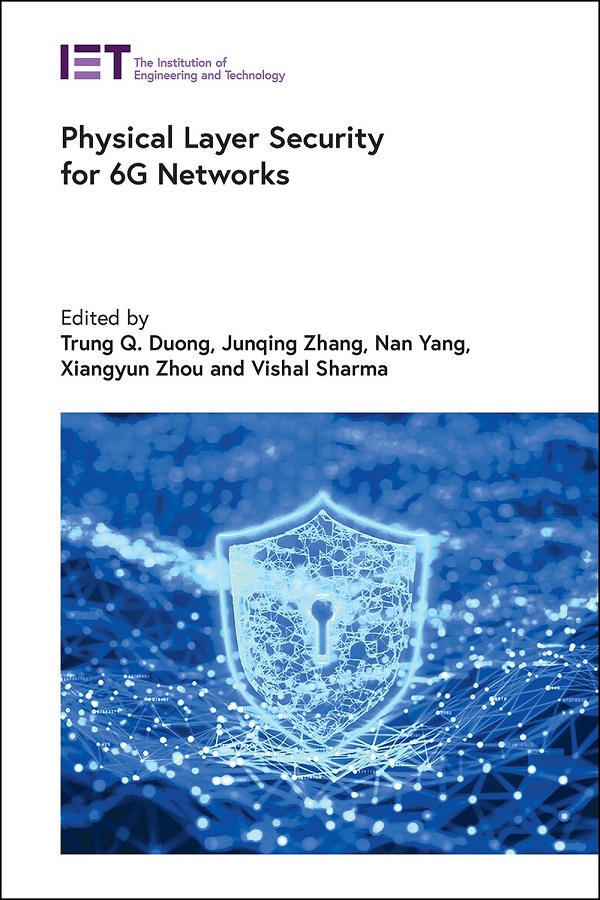- Agricultural Engineering and Technology
- Applied Physics
- Built Environment
- Computing and Networks
- Control, Robotics and Sensors
- Electrical Regulations
- Electromagnetics and Radar
- Energy Engineering
- Healthcare Technologies
- History and Management of Technology
- IET Codes and Guidance
- Manufacturing
- Materials, Circuits and Devices
- Model Forms
- Security
- Telecommunications
- Transportation

Physical Layer Security for 6G Networks
Edited by Trung Q. Duong, Junqing Zhang, Nan Yang, Xiangyun Zhou, Vishal Sharma
6G networks are expected to provide one-microsecond latency communication with a billion devices competing for resources 1000 times faster than current standards. Increases in network speed, heterogeneity, virtualization, better radio requirements and adaptive communications will place new demands on physical layer security. Moreover, IoT, blockchain, and artificial intelligence are enabling technologies that require rapid data rates, raising a significant burden on the network's physical layer, requiring that security must be attained at a fast pace, and that the network must be resilient to accommodate sudden changes to the configurations or the load.
Physical layer (PHY) security solutions are needed that have the capacity to handle the new demands of 6G networks, whilst protecting those networks against risk factors such as interference, data spoofing, replay attacks, side-channel attacks, jamming, traffic analysis, and cyber-vandalism attacks. This comprehensive book addresses the PHY security challenges and proposes efficient and resilient physical layer security solutions for beyond 5G networks leading to 6G. Several topics have emerged that rely on PHY security in solving real-world network challenges such as ultra-dense networks, adaptive communication, distributed technology, and artificial intelligence.
Physical Layer Security for 6G Networks helps readers understand the expectations of 6G's physical layer security in supporting pervasive and integrated communication networks, AI convergence and utility, and develop better sensing solutions, which go beyond cognitive radio, device-to-device or mm-wave communications.
About the Editors
Trung Q. Duong is a Canada Excellence Research Chair at Memorial University of Newfoundland, Canada, and an adjunct professor at Queen's University Belfast, UK. He also holds the prestigious Research Chair of the Royal Academy of Engineering. His current research interests include physical layer security, 5G-6G networks (small-cell networks, ultra-dense networks, UAV, URLLC, caching, energy-harvesting), real-time optimization, data analytics, and machine learning. He has authored or coauthored several books. He is currently serving as an editor for IEEE Transactions on Vehicular Technology and IEEE Wireless Communications Letters. He is the recipient of the prestigious Royal Academy of Engineering Research Fellowship (2016-20), RAEng Research Chair (2021-25) and won the Newton Prize in 2017. He holds a PhD degree in telecommunications systems from Blekinge Institute of Technology, Sweden.
Junqing Zhang is a senior lecturer in the Department of Electrical Engineering and Electronics at the University of Liverpool, UK. His research interests include the Internet of Things, wireless security, physical-layer security, key generation, and radio frequency fingerprint identification. He has published 35 journal articles in the wireless security area. He serves as a TPC member for major IEEE conferences. He received his PhD degree in electronics and electrical engineering from Queen's University Belfast, UK.
Nan Yang is an associate professor in the School of Engineering at the Australian National University, Australia. His research interests include cyber-physical security, terahertz communications, ultra-reliable low-latency communications, and molecular communications. He serves on the editorial board of IEEE Transactions on Molecular, Biological, and Multi-Scale Communications and IEEE Communications Letters. He received the IEEE ComSoc Asia-Pacific Outstanding Young Researcher Award in 2014. He received his PhD degree in electronic engineering from Beijing Institute of Technology, China.
Xiangyun Zhou is an associate professor at the School of Engineering, the Australian National University, Australia. His research interests cover communication theory and wireless networks, with over 180 publications to date. He has served as an editor of IEEE Transactions on Wireless Communications, IEEE Transactions on Communications, and IEEE Wireless Communications Letters and as an area editor of IEEE Communications Letters. He is a fellow of the IEEE.
Vishal Sharma is a senior lecturer in the School of Electronics, Electrical Engineering and Computer Science (EEECS) at Queen's University Belfast (QUB), Northern Ireland, UK. His areas of interest include defense and security, UAVs, distributed ledger technology, and digital twins. He has authored over 100 journal and conference articles and book chapters, co-edited two books, and won six best paper awards. He served/serves on the editorial board of IEEE Communications Magazine, CAAI Transactions on Intelligence Technology, IET Wireless Communications and Mobile Computing, IET Networks, ICT Express and was the section editor-in-chief of Drones journal. Before coming to QUB, he was a research fellow in the Information Systems Technology and Design (ISTD) Pillar at the Singapore University of Technology and Design (SUTD), Singapore, with Prof. Paweł Szałachowski and Prof. Jianying Zhou, under a project entitled, future-proof blockchain, funded by MoE-Tier 2 grant, Singapore. Before joining SUTD, he worked as a research assistant professor under Industry-Academia Cooperation Foundation in the MobiSec Lab at Soonchunhyang University with research sponsored by ETRI-Korea, NRF-Korea, IITP-Korea, MSITKorea, and AFOSR-USA. He was a postdoctoral researcher with Prof. Ilsun You in the Information Security Engineering Department at Soonchunhyang University in association with Soongsil University, South Korea. Since 2022, he has been affiliated with the Global Innovation Institute as a fellow and works with the Centre for Secure Information Technologies (CSIT) and Centre for Data Science and Scalable Computing (DSSC). He is the director of the Innovation-by-design lab at QUB. He leads the British Computer Society (BCS) Accreditation for QUB and is the Chair of the Computer Science Programme Review Working Group. He is the Northern Ireland Advanced Research and Engineering Centre (ARC) co-investigator. He is a senior member of IEEE and a professional member of ACM.
Publication Year: 2024
Pages: 596
ISBN-13: 978-1-83953-691-5
Format: HBK
Editors: Trung Q. Duong, Junqing Zhang, Nan Yang, Xiangyun Zhou, Vishal Sharma
